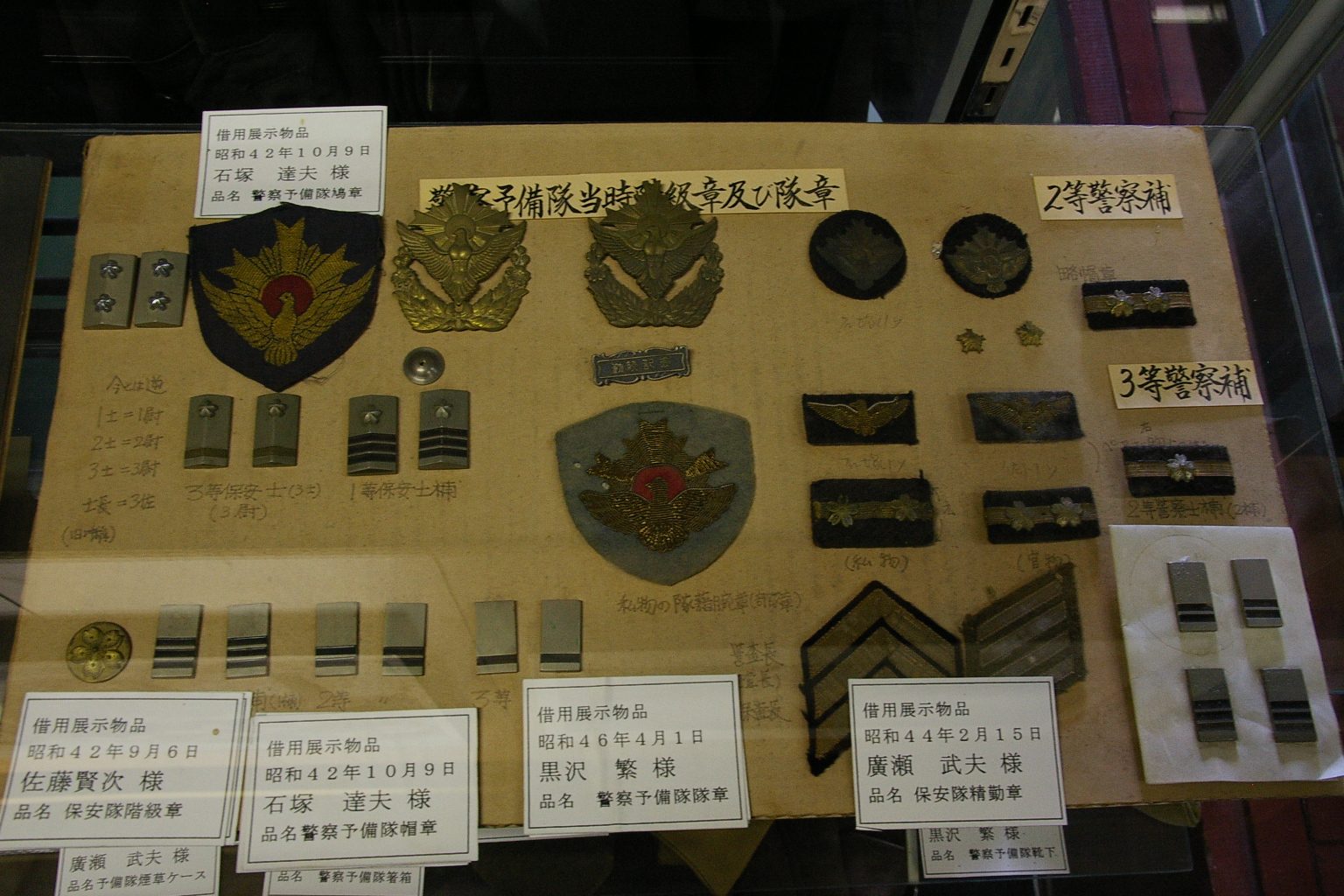National Police Reserve on:
[Wikipedia]
[Google]
[Amazon]
The , or NPR, was a lightly armed national police force established in August 1950 during the
 On the outbreak of the
On the outbreak of the


File:NPR_personnel2.JPG, National Police Reserve Corps, (Showa 27) May 3, 1952
File:1st_Regiment_of_NPR.JPG, Police Reserve Corps 1st Regiment
File:NPR_personnel.JPG, A police officer of a police reserve party who will face the first morning assembly after commissioning
File:Military_exercise_of_NPR1.JPG, NPR bazooka training
Allied occupation of Japan
Japan was occupied and administered by the victorious Allies of World War II from the 1945 surrender of the Empire of Japan at the end of the war until the
Treaty of San Francisco took effect in 1952. The occupation, led by the United States w ...
. In October 1952, it was expanded to 110,000 men and renamed as the . On July 1, 1954, it was reorganized as the Japan Ground Self-Defense Force (JGSDF).
History
 On the outbreak of the
On the outbreak of the Korean War
, date = {{Ubl, 25 June 1950 – 27 July 1953 (''de facto'')({{Age in years, months, weeks and days, month1=6, day1=25, year1=1950, month2=7, day2=27, year2=1953), 25 June 1950 – present (''de jure'')({{Age in years, months, weeks a ...
, many units of the United States Armed Forces
The United States Armed Forces are the military forces of the United States. The armed forces consists of six service branches: the Army, Marine Corps, Navy, Air Force, Space Force, and Coast Guard. The president of the United States is ...
stationed in Japan were transferred to South Korea
South Korea, officially the Republic of Korea (ROK), is a country in East Asia, constituting the southern part of the Korean Peninsula and sharing a land border with North Korea. Its western border is formed by the Yellow Sea, while its eas ...
for combat, and Japan was perceived as lacking defenses. Encouraged by the Supreme Commander for the Allied Powers (GHQ), the Japanese government in 1950 authorized the establishment of NPR, consisting of 75,000 men equipped with light infantry weapons. Personnel affairs of the NPR was taken charge of by GHQ's Government Section (GS) under Brigadier General Courtney Whitney while the efforts to establish and train the force was made by Civil Affairs Section Annex (CASA) under Major General Whitfield P. Shepard.
Given the legal status of police, the National Police Reserve was tasked with the duty to maintain public security
Public security or public safety is the prevention of and protection from events that could endanger the safety and security of the public from significant danger, injury, or property damage. It is often conducted by a state government to ensur ...
under special conditions according to the National Police Reserve Order (Cabinet Order No. 260, 1950), while in terms of unit formation and equipment, it was a de facto
''De facto'' ( ; , "in fact") describes practices that exist in reality, whether or not they are officially recognized by laws or other formal norms. It is commonly used to refer to what happens in practice, in contrast with ''de jure'' ("by la ...
military force modeled after the United States Army
The United States Army (USA) is the land warfare, land military branch, service branch of the United States Armed Forces. It is one of the eight Uniformed services of the United States, U.S. uniformed services, and is designated as the Army o ...
.
In October 1952, the NPR was expanded to 110,000 men and renamed as the National Safety Force (NSF).
On July 1, 1954, after the 1954 Self-Defense Forces Act ct No. 165 of 1954the National Security Board was reorganized as the Defense Agency, and the National Security Force was reorganized as the Japan Ground Self-Defense Force (postwar army
An army (from Old French ''armee'', itself derived from the Latin verb ''armāre'', meaning "to arm", and related to the Latin noun ''arma'', meaning "arms" or "weapons"), ground force or land force is a fighting force that fights primarily on ...
branch of Japan), while the Coastal Safety Force (waterborne counterpart of the NPR) was reorganized as the Japan Maritime Self-Defense Force
, abbreviated , also simply known as the Japanese Navy, is the maritime warfare branch of the Japan Self-Defense Forces, tasked with the naval defense of Japan. The JMSDF was formed following the dissolution of the Imperial Japanese Navy (IJN) ...
(postwar naval branch of Japan).
Ranks

Photos
See also
* Japan Ground Self-Defense Force *Reverse Course
The is the name commonly given to a shift in the policies of the U.S. government and the U.S.-led Allied occupation of Japan as they sought to reform and rebuild Japan after World War II. The Reverse Course began in 1947, at a time of rising Co ...
Notes and references
Notes ReferencesReferences
* * * * * * * * * * * * {{commons category, National Police Reserve of Japan Government paramilitary forces History of the Japan Ground Self-Defense Force Disbanded armies 20th-century military history of Japan 1950 establishments in Japan 1952 disestablishments in Japan Defunct law enforcement agencies of Japan